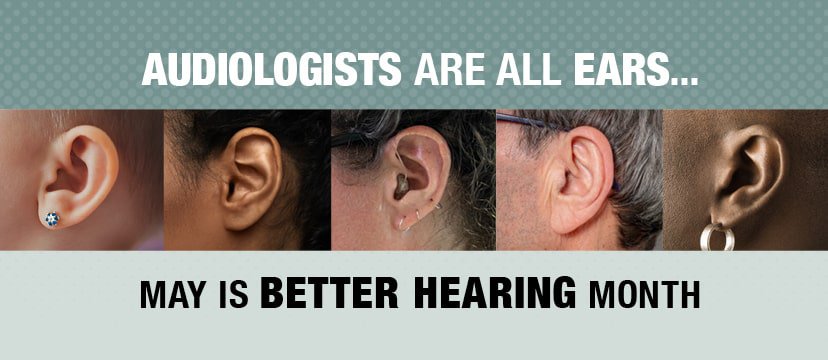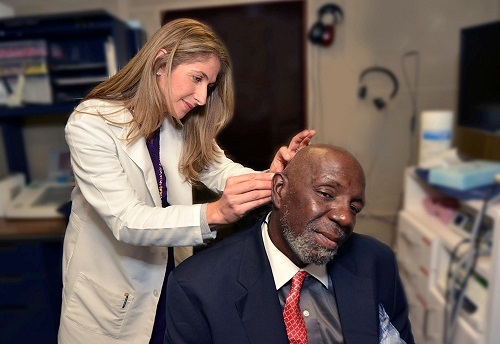Rehabilitation and Prosthetic Services
Veterans Health Administration (VHA) Audiology Services

National Speech-Language-Hearing Month
Each May, this observance provides an opportunity to highlight the importance of communication health and the impact of speech and hearing disorders on individuals and society.
VA’s 2,500 Audiology and Speech Pathologists offer comprehensive services to our Veterans at over 650 VA sites, both in-person and virtually, with a focus on accessibility for Veterans in rural areas affected by auditory disorders. Hearing and audiology impairments are one of VA’s most prevalent service-connected disabilities treated through the use of diagnostics and assistive devices.
Hearing is a Vital Sense

Hearing loss, often referred to as an invisible injury, can greatly affect how Veterans perceive the world. It plays a crucial role in developing relationships with others. Our hearing keeps us engaged while in social settings and while participating in daily activities..
We also rely on our hearing for our safety. It provides us with information on distance, direction, potential risks and spatial awareness. Hearing is even connected with our emotions. Think about the feelings of happiness you have listening to your favorite song, or the soothing emotions evoked by the sound of
Tinnitus
Tinnitus, also known as ringing in the ears, impacts the perception of noise and quality of life, affecting sleep, concentration, mental health and communication. It can cause anxiety, depression, irritability and difficulties in daily tasks.
Most people dismiss the early signs of hearing loss, often attributing it to not speaking clearly enough for people to understand. For many, hearing loss begins gradually. It starts with being unable to hear soft sounds and progresses to other challenges such as difficulty in understanding speech in background noise and in group situations.
Signs of hearing loss may also include consistent requests for repetition, difficulty understanding speech on the phone, increasing the volume on the television or speaking too loudly or too softly. If the progression of hearing loss is left untreated it will eventually impact overall communication, job performance, social interactions with others and overall health.
Hearing Loss and Cognitive Decline
According to a study by the National Institutes of Health, approximately 15% of American adults aged 18 and older have some trouble with hearing and approximately 28.8 million could benefit from the use of hearing aids. As the population ages, more Americans are forced to face hearing health challenges.
While age is still the greatest factor in hearing loss, many younger people also experience hearing difficulty due to exposure to loud music and noises including occupational noise. Among adults aged 70 and older with hearing loss who could benefit from hearing aids, fewer than one in three have used them despite growing evidence that doing so results in better long-term outcomes.
Hearing Loss and Dementia
Hearing loss has been identified as a risk factor for dementia and/or cognitive impairment. Treatment can improve quality of life, improve speech understanding, decrease depression, anxiety, and stress, and may reduce the risk of cognitive decline/dementia.
Untreated hearing loss is a serious concern given its association with social isolation and depression as well as increased risk for dementia and cognitive decline. VA Audiology is proud to provide the highest level of care and state-of-the-art hearing aids to all Veterans,” said Sean McClenny, national director, Audiology and Speech Pathology Services.
Thanks to VA's Audiology and Speech Pathologists
VA is the largest employer of audiologists in the United States, and they play an important role in the VA healthcare system. Our VA audiologists incorporate Whole Health into routine audiology care to support the Veteran’s health and well-being through the prevention, diagnosis, and treatment of hearing disorders to include hearing loss, balance impairment and tinnitus. VHA Audiology has access to the most current, state of the art technologies to include hearing aids, personal amplifiers, assistive technologies, and cochlear implants.
Early identification and rehabilitation for hearing loss are key to helping Veterans with hearing loss function at their best, improve quality of life and improve communication abilities. All these advantages assist the Veteran patient as they navigate the world around them.
VHA’s office of Audiology and Speech Pathology extends sincere appreciation to the more than 2,500 VA speech-language pathologists, audiologists, and health technicians whose dedication and expertise transform Veterans’ lives through life-changing interventions and treatments.
Additional information can be accessed using the below resources.
- Fact Sheet – Hearing Loss and Cognitive Decline/Dementia.*
- Hearing Loss in Adults (asha.org) *
Contact Information
Email inquiries to the VA audiology service can be sent to: vhaaspsprogramoffice@va.gov
Resources
- VA Audiology Fact Sheet (PDF)
- VA Hearing Aids Fact Sheet (PDF)
- Denver Logistic Center (DLC) Homepage
- How to Order Batteries through the DLC
- How to Request a Hearing Aid Repair through the DLC
- How to order batteries and accessories through VA.gov
- VA Audiology YouTube Playlist
*The links above will take you outside of the Department of Veterans Affairs Website. VA does not endorse and is not responsible for the content of the linked websites. The link will open in a new window.



















